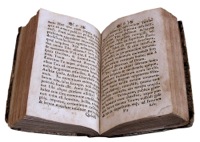Difference between revisions of "Second-hand"
(Created page with 'File:lighterstill.jpgright|frame *[http://en.wikipedia.org/wiki/17th_century 1654] ==Definitions== *1: not directly known or experienced: se...') |
m (Text replacement - "http://" to "https://") |
||
| (One intermediate revision by one other user not shown) | |||
| Line 1: | Line 1: | ||
| − | [[File:lighterstill.jpg]][[File: | + | [[File:lighterstill.jpg]][[File:Books_-_antique_and_second_hand.jpg|right|frame]] |
| − | *[ | + | *[https://en.wikipedia.org/wiki/17th_century 1654] |
==Definitions== | ==Definitions== | ||
*1: not directly known or [[experienced]]: secondhand [[knowledge]]. | *1: not directly known or [[experienced]]: secondhand [[knowledge]]. | ||
| Line 9: | Line 9: | ||
:b : dealing in secondhand merchandise <a secondhand bookstore> | :b : dealing in secondhand merchandise <a secondhand bookstore> | ||
==Description== | ==Description== | ||
| − | A '''second-hand''' or used good is one that is being purchased by or otherwise transferred to a second or later [ | + | A '''second-hand''' or used good is one that is being purchased by or otherwise transferred to a second or later [https://en.wikipedia.org/wiki/End_user end user]. A used good can also simply mean it is no longer in the same condition as it was when it was first transferred to the current end user. Used [[goods]] may be transferred informally between [[friends]] and [[family]] for free as "hand-me-downs" or they may be sold for a fraction of their original price at garage sales or in church [https://en.wikipedia.org/wiki/Bazaar bazaar] fundraisers. [[Governments]] require some used goods to be sold through regulated [[markets]], as in the case of items which have [[safety]] and [[legal]] issues, such as used firearms or cars; for these items, government licensing bodies require certification and registration of the sale, to prevent the sale of stolen, unregistered, or unsafe goods. As well, for some high-value used goods, such as cars and motorcycles, governments regulate used sales to ensure that the government gets its sales tax revenue from the sale.[https://en.wikipedia.org/wiki/Second_hand] |
[[Category: General Reference]] | [[Category: General Reference]] | ||
Latest revision as of 02:08, 13 December 2020
Definitions
- 1: not directly known or experienced: secondhand knowledge.
- 2a : received from or through an intermediary : borrowed
- b : derivative <secondhand ideas>
- 3a : acquired after being used by another : not new <secondhand books>
- b : dealing in secondhand merchandise <a secondhand bookstore>
Description
A second-hand or used good is one that is being purchased by or otherwise transferred to a second or later end user. A used good can also simply mean it is no longer in the same condition as it was when it was first transferred to the current end user. Used goods may be transferred informally between friends and family for free as "hand-me-downs" or they may be sold for a fraction of their original price at garage sales or in church bazaar fundraisers. Governments require some used goods to be sold through regulated markets, as in the case of items which have safety and legal issues, such as used firearms or cars; for these items, government licensing bodies require certification and registration of the sale, to prevent the sale of stolen, unregistered, or unsafe goods. As well, for some high-value used goods, such as cars and motorcycles, governments regulate used sales to ensure that the government gets its sales tax revenue from the sale.[1]
